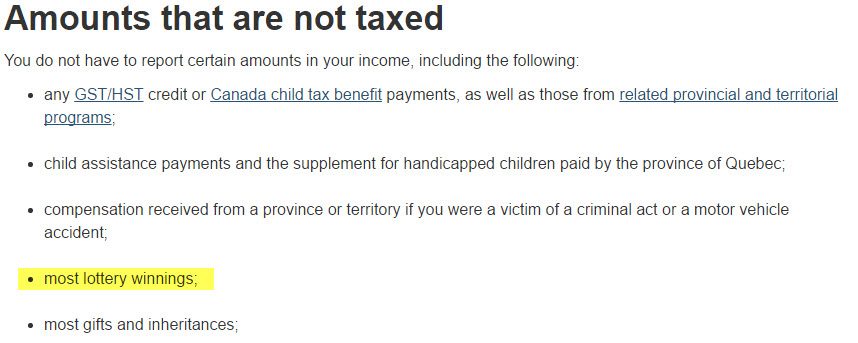Are Poker Winnings Taxable In Canada
On August 29, 2013, the Federal Court rendered its judgment in Radonjic v. Canada Revenue Agency, 2013 FC 916. It is the latest decision on the (non-)taxation of poker winnings following the Tax Court of Canada decision in Cohen v. The Queen, 2011 TCC 262. Radonjic is a judicial review of the Minister of National Revenue’s discretion to allow or disallow taxpayer-requested adjustments to past income tax returns. Although an important distinction from the ordinary appeals to the Tax Court of Canada, Radonjic is still a noteworthy case because the Federal Court applied the facts of Mr. Radonjic to the relevant law in the aftermath of Cohen.
The heart of the issue in cases such as these is whether poker players are “carrying on a business” – a factual issue to be determined on a case-by-case basis. Both the Tax Court of Canada (in Cohen) and the Federal Court (in Radonjic) determined that the taxpayers in question were not carrying on a business. Although these decisions do not set a general precedent for all poker players across the country, they do present important factual signposts in the landscape between poker players who are hobbyists and poker players who are carrying on a business.
In Cohen, the taxpayer quit his day job as a lawyer to become a professional poker player. He read books and articles about poker, set up online accounts to play online, attended a seminar, testified that he had devised a strategy to play against inexperienced players, testified that he had programs to take notes on players as he was playing against them online and that he adhered to a playing schedule of 6 to 8 hours per day, 7 days a week. Although he intended to play small stakes poker, Mr. Cohen deviated from that strategy for the allure of higher stakes. The Tax Court concluded that Mr. Cohen was a hobby poker player.
In Radonjic, the taxpayer stopped accepting contract work from the federal government because he thought he could support himself with his poker winnings. He did so successfully for more than 3 years. He set up online accounts to play poker and played on a regular basis. As is common for online poker players, he played at multiple tables simultaneously. Contrary to conclusion reached by the Canada Revenue Agency, the Federal Court found Mr. Radonjic to be a hobby poker player, stating that he was “the usual enthusiastic and everhopeful poker player engaged in a personal endeavour”.
Canada In Canada gambling income is not generally taxable. If the gambling activity can be considered as a hobby, the income is not taxable. If the gambling is carried out in businesslike behaviour, then the income is taxable and losses deductible. Breadcrumb Trail Links. Taxes; Your online gambling wins might be taxable. Jamie Golombek: If the main source income comes from online poker gaming, that is taxable business income, compared to another taxpayer who perhaps has a full-time job yet may be 'addicted' to poker in his spare time. One other comment should be made: If one has income from an illegal activity, in Canada that income is still generally taxable even though ill-gotten. 9 Accordingly, players and gaming operators (including poker operators and players) committing offences under the Criminal Code, whether in bricks-and-mortar facilities or online, may still very well be taxable on their activities. 1 (the “Act”).There is an excellent and recent article addressing the income tax aspects of poker in Canada: Income Taxation of Poker Winnings in Canada by Benjamin Alarie. Some players think that the odds are better in Canada while others believe that they can evade American taxes by winning in Canada. American Tax Laws. There are no income taxes on Canadian lottery winnings for Canadian citizens. Canadian tax authorities do not consider lottery earnings to be taxable for purposes of Canadian income tax.
In the analysis of whether Mr. Radonjic carried on a business, the Federal Court made the following statements that appear to have general application to online poker players:
- Success at playing poker online on a computer on an intense and regular basis over an extended period of time does not, by itself, equate to a “system” of increasing poker winnings and minimizing the risk of losses.
- Everyone who competes in online poker does so to win and attempts to narrow odds in their favour (which is somewhat of a bland statement as most poker players, hobbyists and businesspersons alike, will know that a pair of aces will have a better success rate than 7-2 off-suit in Texas Hold’em). By studying, practicing, and improving their skills to narrow the odds, it does not mean that the taxpayer has devised a system of winning; chance remains the predominant factor in whether they amateur poker players win or lose, as it did on Mr. Radonjic’s facts.
- Setting up a method of payment to collect online winnings is not an indicator of a system.
These cases are a double-edged sword. While Mr. Radonjic’s winnings were not taxable, Mr. Cohen’s losses (being losses that did not result from a business) could not be deducted against other sources of income. It will be interesting to see what facts will be necessary in order to tip the balance and turn the amateur poker player into someone that is carrying on a taxable business.
Gambling online and in brick-and-mortar establishments is a leisure activity for some – but for many, gambling is their profession. There is no shortage of professional poker players, sports bettors, bridge players and blackjack players out there making their living through gambling. Knowing about tax-laws and obligations as a gambler is essential, as mistakes can be very costly.

In some countries, gambling is 100% illegal. In countries where it is legal, there are regulations, rules & taxes to consider. In some countries and statres, casinos and betting establishments must obliged to pay tax on their profits, and in some cases, it is up to the individual to declare and pay taxes on their winnings.
International Tax Rates on Gambling Earnings
The biggest winners in the table are gamblers from the United Kingdom – with an effective tax rate of zero on ALL winnings,. This applies to all types of gambling—including poker, slots and casino games, lotteries, sports-betting & horse racing. Instead, gambling operators must pay taxes, and online gambling site operators must pay UK gambling tax duty.
In the United States, the tax rate owed on gambling winnings is a flat 25%. If you win big in Las Vegas at poker, the casino must withhold the 25% when collect your cashout, and provides you with IRS form W2-G to report your winnings to the government. Find out more on the IRS website.
Laws in Canada treat amateur and professional gamblers very differently for taxation purposes. According to the Income Tax Act, anyone in Canada winning a lottery prize or winning at a game of chance is not subject to income tax on those winnings. … In cases of sports betting, poker, or casino games and slots, winnings are also not liable for taxation – unless you are a professional gambler (as defined by paragraph 40(2)(f) of the Income Tax Act,). If you are , you must declare gambling winnings when you file your taxes and will be charged 26%.
Don’t get Yang-ed
Back in 2007, poker-player Jerry Yang topped 6,358 players at the World Series of Poker Main event, winning $8.25 million.
On a podcast, Yang admitted to bad financial management paying taxes of just $900,000 in California, and giving along with donations and gifts to family and friends. After bad financial advice he waa left with a huge federal tax bill. Subsequently the IRS seized the his Corum main event bracelet along with other jewelry to be auctioned off to the public in order to pay Yang’s outstanding tax-bill of $571,894.54 !
2019 World Series of Poker – Main Event: Final Table Tax-Bill

Are Gambling Winnings Taxable In Canada

The 2019 WSOP Main event final table payouts combined to total $30,825,000.
Are Poker Winnings Taxable In Canada
The nine lucky players who cashed on the final table of the 2019 main-event can expect to pay a combined tax bill of $11,972,653 – or around 40% of the total prizepool. You can see from the table above that despite finishing in 7th place, Londoner Nick Marchington walks away with more money in his pocket than 6th place finisher Zhen Cai!
Make sure you know about your tax obligations as a gambler, and manage your money and tax-payments appropriately, because the tax-man always wins!